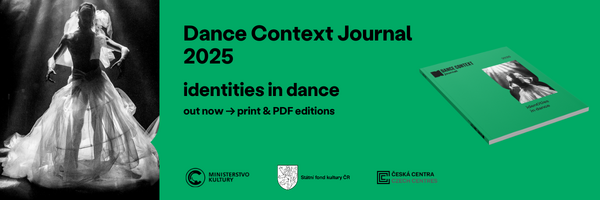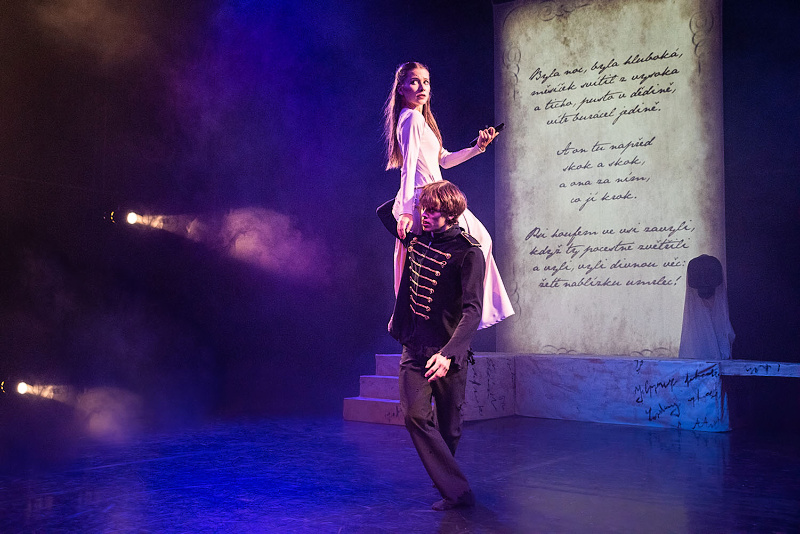A Bouquet for the whole family
The J. K. Tyl Theatre ballet company has decided to spice up the first days of school with a new premiere - the ballet Kytice (A Bouquet of Czech Folktales). Considering the abundance of Bouquets on the Czech ballet scene in the last few years, Pilsen cannot take credit for an innovative dramaturgy, however, the production is easily readable and comprehensible for young audiences. In a dense, seventy-minute-long piece, the company presents four ballads by Karel Jaromír Erben, based on Antonín Dvořák’s musical adaptation: The Wedding Shirts, The Water Goblin, The Noon Witch and The Golden Spinning-Wheel. The direction supervisor Irena Žantovská has revisited Dvořák’s libretto, and her ideas have been adapted for dance by her colleague Richard Ševčík.
We are guided through the piece by the character of the Poet (Jiří Aster Srnec), whose words and thoughts written on a parchment are gradually taking shape on the screen and onstage, where other characters and tales are also coming to life. The audience are sitting on three sides of the stage, the auditorium gets never fully dark and thanks to the Poet, the spectator becomes a partner and listener to the gloomy tales. Due to general principles, the poetry comes to life within a minimalist conception. To illustrate the various examples, the stage designer Adam Valášek uses a light upstage area and a door on wheels, which the performers can slide around the dance floor. It becomes an imaginary bridge between Erben’s world and his tales, between the land and the underwater kingdom, it can transform into a charnel house or a castle. The image is completed by matching period furniture, corresponding to archaic Czech coming out of a speaker. The individual characters are defined by simple costumes, beige dresses or black pants, and by a few delicate accessories that can turn them into maidens, mothers, corps or bridegrooms.
In an epic manner, six dancers illustrate the storylines of the four ballads which have been reduced to the key sections of recited text and dramatic musical passages of Dvořák’s opuses. Emphasis is laid on expressing intense emotions without employing affected pantomime – the stage is full of jumps, lifts, dramatic twists, and dynamic turns. The choreographer did not shy away from letting the dancers whirl and take all the space, so they could display their technical as well as acting skills.
The Maiden (Abigail Jayne Baker) played an immensely important role in the piece – though her guilt and punishment were supressed in some of the ballads (in The Water Goblin), she became a symbol of reconciliation and salvation (The Wedding Shirts, The Golden Spinning-Wheel). She managed to maintain an appropriate stage expression throughout the whole performance. The male principle and object of women’s desire and quarrels was gracefully and confidently embodied by Gaetan Pires (the Lover in The Wedding Shirts, the King in The Golden Spinning-Wheel). Lýdie Švojgerová could be more convincing in the challenging role of the Mother whose boundless love brings about evil for which she is cruelly persecuted (The Water Goblin, The Noon Witch, The Golden Spinning-Wheel). The demanding role of the Water Goblin has been taken up by Justin Rimke who seems to have enough potential to take more risk in the upcoming re-runs and shine on stage. Lightly and with ease, Sara Aurora Antikainen danced the Wicked Sister, Michal Lenner’s performance as the Dead Man or the Groom was also refreshing. The six dancers also took part in group scenes: Pires along with Antikainen danced the two-headed and four-legged Noon Witch. At any rate, the company proved they were in great shape after the summer break, though it became obvious Czech dancers are generally more and more rare in Czech ballet companies. Maybe they excel somewhere abroad…
Pilsen’s A Bouquet of Czech Folktales surprised me by its homogenity despite radical shortcuts. It lacked the typical cruelty, it did not illustrate or analyse the consequences of one’s acts – instead, these were dryly recited by the narrator. Although it appears to me that this is not Erben as we know him and whose poetry gives us chills, it is obvious that this format is more accessible to children. For the first time ever, I have seen The Golden Spinning-Wheel arranged as a comedy for which I felt really grateful.
Richard Ševčík’s functional choreography, preferring message over innovation, was not boring and enriched the piece with its own poetics. Ševčík takes advantage of such opportunities and keeps gaining valuable experience. Let’s hope he wants to reach higher and will not get stuck in the craft of “fulfilling the music”. However, this ballet premiere for wide and young audiences opened the season in a great style.
Written from the premiere 7 September 2019, Malá scéna DJKT Plzeň (Small Scene of DJKT Pilsen).
A Bouquet of Czech Folktales
Direction: Irena Žantovská
Choreography: Richard Ševčík
Music: Antonín Dvořák
Stage and costume design: Aleš Valášek
Projections: Jakub Mareš
Lighting design: Richard Ševčík
Musical arrangement: Matouš Pilný
Première: 7 September 2019




